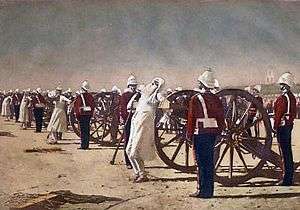Suppression of the Indian Revolt by the English
Suppression of the Indian Revolt by the English is a late-19th-century painting by Russian artist Vasily Vereshchagin. The work depicts several Sepoys being executed by being "blown from a gun" in the aftermath of the Indian Rebellion of 1857. The painting's location is unknown.[1]
| Suppression of the Indian Revolt by the English | |
|---|---|
 | |
| Artist | Vasily Vereshchagin |
| Year | c. 1884 |
| Medium | Oil on canvas |
History
Vereshchagin painted Suppression of the Indian Revolt in 1884 following a trip to British India. Having already visited the holy land in the same trip and been inspired by the history there, Vereshchagin began to consider producing a series of painting depicting various forms of execution; one such method of execution was being "blown from a gun", in which the condemned was tied to the muzzle of a cannon and before being violently dismembered when the cannon was fired.[2] This method was infamously used during the suppression of the Indian Rebellion of 1857, which Vereshchagin heard stories about while in India.[3][2]
Following his return to Europe and his subsequent painting of three execution scenes (later referred to as his "trilogy of executions"), Vereshchagin took his paintings on tour in Britain and the United States. While Suppression was well-received in the United States,[3] the painting was criticized by members of the British government and its subject matter was controversial with the British public.[3] The British Crown purchased the work, after which it disappeared; multiple sources report that the work was possibly destroyed.[4][1]
Description
Vereshchagin, a famous war artist known for his realism, painted Suppression of the Indian Revolt in 1884. The work is anachronistic; it depicts a real event from the 1857 rebellion, but also shows British soldiers wearing contemporary uniforms.[1][5] The painting was part of Vereshchagin's "trilogy of executions", which also included the works Execution of Conspirators in Russia and Crucifixion by the Romans.[6]
References
- Ilina, Anastasiia. "An Introduction to Vasily Vereshchagin in 10 Paintings". Culture Trip. Retrieved 2018-10-25.
- Havholm, Peter (2008). Politics and Awe in Rudyard Kipling's Fiction. Aldershot, England and Burlington, VT, USA: Ashgate Publishing, Ltd. ISBN 978-0-7546-6164-1. Retrieved 2 May2013.
- Baylen, Joseph O., and Jane G. Weyant. "Vasili Vereshchagin in the United States." The Russian Review 30, no. 3 (1971): 250-59. doi:10.2307/128133.
- "Vasily Vereshchagin Biography (1842-1904) - A Russian Painter Life". Totally History. 2013-02-10. Retrieved 2018-10-25.
- "Vasily Vereshchagin – Russiapedia Art Prominent Russians". russiapedia.rt.com. Retrieved 2018-10-25.
- "Exhibitions Element | The State Museum of Political History of Russia". www.polithistory.ru. Retrieved 2018-10-25.